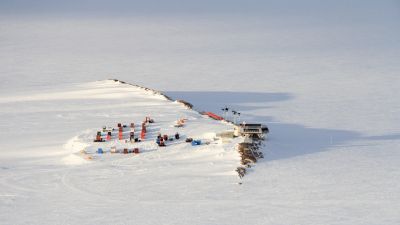
Belgium’s Antarctic Research Station: a Global Sustainability Benchmark
The International Polar Foundation (IPF) unveiled today the final plans for Belgium's Princess Elisabeth Antarctic research station, to be built during the International Polar Year 2007-08 (IPY).
The station will enable Belgium, and other nations participating in its science program, to carry out important research on climate change and Antarctica's key role as part of the global climate system. This research will contribute to the massive international scientific effort scheduled for the IPY.
"The International Polar Foundation is very pleased to be able to work with the Belgian Government in making this station Antarctica's most sustainable research platform," Alain Hubert, Chairman of the IPF, said today.
Hubert went on to say that "the Princess Elisabeth station will represent international best practice in being entirely run on renewable energy and in recycling completely all its waste products. Belgium, one of the twelve original signatories of the Antarctic Treaty, will not cause any damage to the pristine Antarctic environment".
"When we already know that we need to live in a more sustainable manner to avoid drastic climate change, we must certainly also research in a sustainable manner in the Antarctic" Hubert said.
The station will be situated inland, near the Sor Rondane Mountains in Dronning Maud Land, not far from where Belgium maintained the "Roi Baudouin" base for a decade following the last international polar year (1957-58). The station site (at 71 degrees South and 23 degrees East) is in the 1500 kilometer empty stretch between the Japanese Syowa station and the Russian Novolazarevskaya station.
The Belgian Government, following its 2004 decision to take up the IPF's proposal for a new base, announced on 19 May 2006 that it would provide €3 million to the Belgian Science Policy Office (BELSPO) for the station's management and research program in 2008 and 2009. The construction of the base is expected to cost around €6.4 million, of which €2 million has already been committed by the Belgian Government, the remainder having to be found by the IPF through private sector sponsorship and public donations.
The Belgian Government also announced on 19 May that it would mint a commemorative coin for public sale with the proceeds to go towards the International Polar Foundation and its fundraising for the Princess Elisabeth station.
The station's research program is expected to involve scientists from European nations as well as other international researchers, including Japan. Building on the existing BELSPO Antarctic research program (with a budget of around €6 million over 2006-2010), the additional research funding will help tackle some of the key questions concerning the vast Antarctic continent and our planet's endangered climate.
